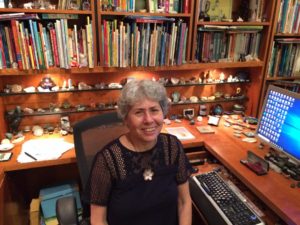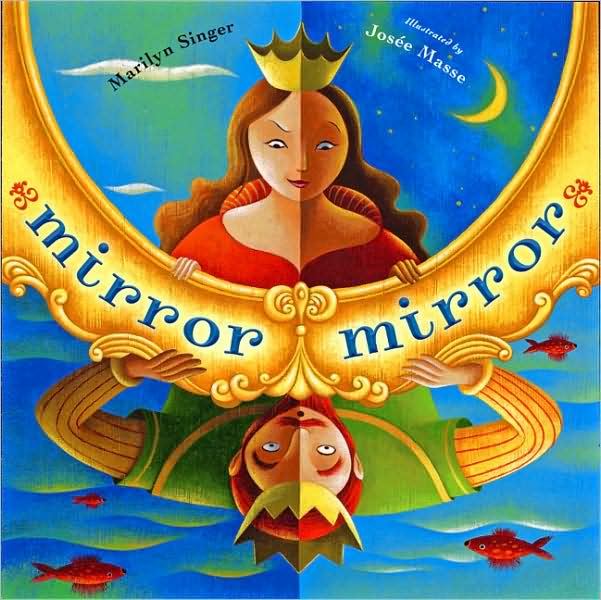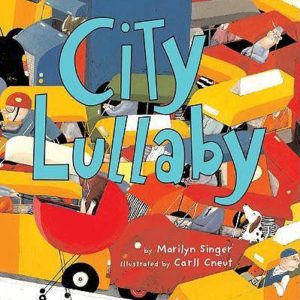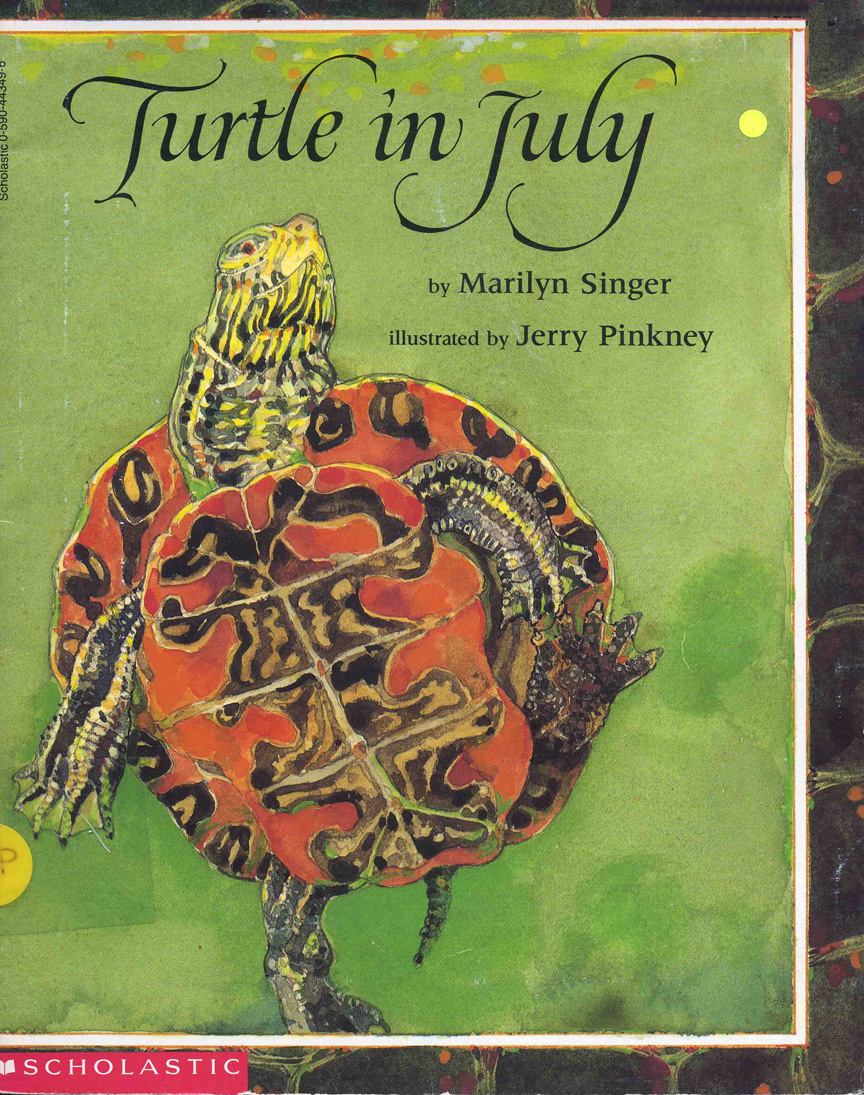 This month’s Author Interview at Only Picture Books is with Marilyn Singer, the author of 90+ books for children and young adults. In addition to being an incredibly prolific author, she’s the host of the former AOL Children’s Writers Chat and currently co-hosts the Poetry Blast at various conferences.
This month’s Author Interview at Only Picture Books is with Marilyn Singer, the author of 90+ books for children and young adults. In addition to being an incredibly prolific author, she’s the host of the former AOL Children’s Writers Chat and currently co-hosts the Poetry Blast at various conferences.
Need more Marilyn bio nuggets? Try these five facts:
- She LOVES swing dancing.
- She auditioned for Jeopardy but didn’t get selected–yet.
- She got to sing with a chorus for a track on the recording of the revival of the Broadway musical, Pippin.
- She’s lives with a cat named Benito and a poodle named Bizzy.
- She writes in so many different styles and genres—picture books, realistic novels, fantasy, mysteries, fairy tales, nonfiction, poetry, etc.—because it “keeps her from getting bored.”
Feel like you’ve got enough of a sense of things now to move straight to interview time? Let’s go!
Website: https://marilynsinger.net/
Facebook: https://www.facebook.com/WriterBabe
RVC: It’s my understanding that your love for language emerged at a very early age thanks to the efforts of your family. What specifically did they do?
MS: My Romanian grandmother, who lived with us, told me marvelous stories every night. My parents read to me a lot, especially fairy tales and poetry. They also sang to me popular songs of the day. I grew up appreciating great lyricists such as Cole Porter, Ira Gershwin, Lorenz Hart, and Johnny Mercer. So, my family really did teach me to love language.
RVC: Rumor has it that you were writing your own poems in elementary school. What did you like most about poetry back then?
MS: I think I liked the rhythm and musicality, particularly because I loved songs and singing. I also liked the emotion behind poetry and the fact that it could move me and other people and also make us laugh.
RVC: Despite all that, you didn’t consider writing as a career until a few years after college, right? Why not? What helped you make the move into the world of words?
MS: Oh, I thought about writing as a career way back in elementary school—that, and having a dog kennel. 😉
But as I got older, my mom said that teaching was a stable career for a woman, and I decided she was probably right. So, I did become a high school English teacher, but I didn’t stay long in that career. I was rather rebellious and didn’t get along with the administration. When I quit teaching, I wasn’t sure what I wanted to do. My husband, Steve Aronson–head of the film department of the American Federation of Arts–got me jobs writing teaching guides and catalog copy about films and also filmstrips (remember those?). Then one day to my surprise, when I was sitting in the Brooklyn Botanic Garden, I started writing stories about insect characters I’d made up when I was eight. I read the stories to Steve, who was encouraging, and I joined the Bank Street Writers Lab, and the members were also positive. I submitted those and other stories and I was very lucky. I got a manuscript accepted after about six months.
Would that it were that easy since!
RVC: Tell us a bit more about that first book and what it meant to you.
 MS: Well, as I said, I was most fortunate. My first book was The Dog Who Insisted He Wasn’t. Ann Durell at Dutton accepted it and my next two books as well. I imagined my own dogs talking and having particular ideas and traits about personhood, and I think the book grew out of that. Once it and my next books were published, I decided that maybe I WAS a writer. It’s not an easy profession, though. It has serious ups and downs—from acceptances and rejections to good sales and low ones to books still in print for decades to those going out of print after a year. Still, I get to make my own hours and work in my pjs if I want to, and that’s not bad!
MS: Well, as I said, I was most fortunate. My first book was The Dog Who Insisted He Wasn’t. Ann Durell at Dutton accepted it and my next two books as well. I imagined my own dogs talking and having particular ideas and traits about personhood, and I think the book grew out of that. Once it and my next books were published, I decided that maybe I WAS a writer. It’s not an easy profession, though. It has serious ups and downs—from acceptances and rejections to good sales and low ones to books still in print for decades to those going out of print after a year. Still, I get to make my own hours and work in my pjs if I want to, and that’s not bad!
RVC: What’s one thing that non-poets don’t fully appreciate about poetry?
MS: Hmm, I don’t know if they realize that good poetry is hard to write and that it doesn’t always have to rhyme. A lot of folks who dislike poetry think it’s abstruse, which may be true of some poems, but certainly not all. Some also think that there’s just one type of poetry, which isn’t true in the least. I believe that there’s a poem or a type of poetry for all readers to enjoy. But they may need help finding it, which is where teachers, parents, other relatives, and friends come in.
 RVC: Just the other day, I picked up Mirror Mirror: A Book of Reverso Poems in my weekly grab-whatever-catches-my-eye run at the public library. What made you think of creating a book like that?
RVC: Just the other day, I picked up Mirror Mirror: A Book of Reverso Poems in my weekly grab-whatever-catches-my-eye run at the public library. What made you think of creating a book like that?
MS: One day I was watching my cat sitting in an easy chair and a poem came into my head:
A cat Incomplete:
without A chair
a chair: without
Incomplete. a cat.
I began to wonder if I could come up with more poems like that. I wrote a number of them on a variety of subjects, but quite a few were based on fairy tales. I showed them to an editor who suggested I do an entire collection based on fairy tales, and that’s how Mirror Mirror (Dial, 2010), with divine illustrations by Josée Masse, came about.
I originally called them up-and-down poems. It was my husband who came up with the word “reverso.” To write a reverso, I follow strict rules—when the lines are reversed, there are changes in just punctuation and capitalization, and the second half of the poem has to say something different from the first half. These poems are tricky to write. I have to be in a games-playing head. Also, I have to write them on a computer, as opposed to a legal pad (which is how I write many of my poems) so that I can shift around the lines and see if they make sense.
RVC: You’ve got a host of animal-related books out in 2019 and 2020—one on presidential pets, one on insects and spiders, one on animals that live in cities, and one on how animals eat. Did you write a lot of animal poems and they sort of fell into these categories, or do you come up with the title/idea first and then create the poems?
 MS: The theme came up first for each of those books. Then I started to write the poems. Two of those books, Bug Dipping, Bug Sipping (S&S, 2020) and Gulp, Gobble (S&S, 2019) are each really a single poem. Who Named Their Pony Macaroni? (Disney-Hyperion, 2019) and Wild in the Streets (Quarto, 2019) are collections. I never feel that I have a collection in the works until I write a minimum of five to seven poems. And then I have to write a lot more to finish the collection.
MS: The theme came up first for each of those books. Then I started to write the poems. Two of those books, Bug Dipping, Bug Sipping (S&S, 2020) and Gulp, Gobble (S&S, 2019) are each really a single poem. Who Named Their Pony Macaroni? (Disney-Hyperion, 2019) and Wild in the Streets (Quarto, 2019) are collections. I never feel that I have a collection in the works until I write a minimum of five to seven poems. And then I have to write a lot more to finish the collection.
RVC: When do the titles happen?
MS: The title almost always comes last, sometimes after much discussion with editors, marketing people, and friends.
RVC: So, you’re essentially a lifelong New Yorker. And what’s something most people don’t appreciate or understand about being a New Yorker?
MS: That’s an interesting question. I think a lot of people believe that New Yorkers are cold or hard when in fact people here are generally friendly and helpful. I’m a native New Yorker and I find I start conversations with folks anywhere and anytime. People here love to give directions and advice on things to see and do. And they will help you if you are in trouble. I once tripped on the street and a stranger picked me up and held me until I said I was fine. We do tend to be in a hurry a lot of the time, though, and I know that when I’m trying to get to a Broadway theater, I get impatient with tourists taking selfies. 😉
RVC: How does your New York-ness play into your writing?
 MS: I think the energy here gives me energy to write, and I also think some of my work is inspired by the city—books such as City Lullaby and poems in Nine O’Clock Lullaby, On the Same Day in March, A Full Moon Is Rising, Every Month Is a New Year, and Wild in the Streets, just to name a few.
MS: I think the energy here gives me energy to write, and I also think some of my work is inspired by the city—books such as City Lullaby and poems in Nine O’Clock Lullaby, On the Same Day in March, A Full Moon Is Rising, Every Month Is a New Year, and Wild in the Streets, just to name a few.
RVC: Of the many awards and honors you’ve received, which meant the most to you?
MS: I was thrilled to receive the 2015 National Council of Teachers of English (NCTE) Excellence in Poetry for Children Award because it was for the body of my work. I found out I’d won it at a birthday brunch for my husband, so we both got to celebrate that day.
RVC: Now it’s time to close things out with the Awesome Sauce, Mesmerizing, Life-or-Death-Stakes* SPEED ROUND! (*life or death stakes not included!) Ready?
MS: As Neil deGrasse Tyson would say, “Let’s do this!”
RVC: Cake, cupcakes, or pie?
MS: Pie—or maybe tres leches cake.
RVC: Three careers you might’ve had if you never got into kidlit?
MS: Casting director. Zoo keeper. Cabaret singer.
RVC: So, you’re having a dinner party with three guests from the world of books. Living or dead, real or imaginary, what three characters would you invite?
MS: I’d invite Shakespeare, Lin-Manuel Miranda, and Irene Pepperberg, who studies parrots. They’ve all written books/plays, so do they count?
RVC: Of course! It’s your party, after all. Next question–which of your books is your secret favorite?
 MS: That’s a really hard question to answer. I’m fond of my first poetry collection, Turtle in July, and Mirror Mirror, too, since it was a surprise even to me! I also really like The First Few Friends, a YA novel set in the late 60s that bombed at the box office, as it were. I think it might’ve done better if it had been published today.
MS: That’s a really hard question to answer. I’m fond of my first poetry collection, Turtle in July, and Mirror Mirror, too, since it was a surprise even to me! I also really like The First Few Friends, a YA novel set in the late 60s that bombed at the box office, as it were. I think it might’ve done better if it had been published today.
RVC: Most underappreciated yet awesome kidlit poet working today?
MS: All kidlit poets are underappreciated! Poetry is underappreciated! You’re not going to get me to name names. 😉
RVC: What would you like your literary epitaph to be?
MS: I came, I saw, I wrote about it.
RVC: Thanks so much, Marilyn!

